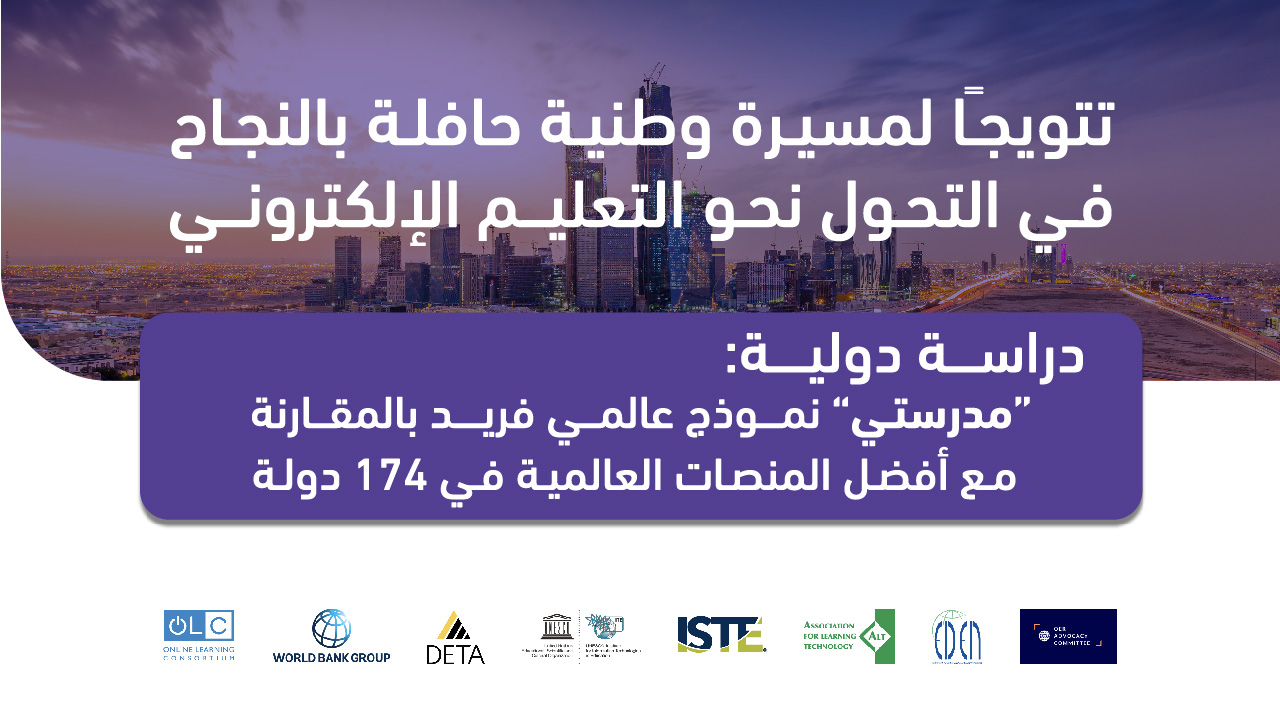
The Online Learning Consortium (OLC), with the participation of several international institutions, issued the International Developmental Study - eLearning in The Kingdom of Saudi Arabia During Covid-19, Phase II, with the participation of 453,879 students, teachers, parents, and faculty members, including more than 387,000 participants from K12, and more than 65,000 participants from higher education.
Several reliable international educational organizations have recognized the Saudi leading model in the eLearning field due to the Kingdom’s distinctive capabilities and its rapid response to changes, its contribution to creating many innovative solutions to provide eLearning efficiently, and the continuation of the learning process despite all the circumstances and challenges caused by the pandemic thanks to the unlimited support that the eLearning sector received by the wise leadership to achieve Vision 2030 goals.
The study included a comparison of Madrasati Platform with the top 7 International platforms and 174 countries; it showed the remarkable superiority of the platform as an internationally leading model and one of the eLearning solutions in developed countries during the pandemic, with more than 6 million users and an access rate of 98%, and that it is unique compared to the efforts exerted by other countries to implement the learning management system at the national level for the public education.
The study also highlighted a significant development in the digital literacy of the eLearning ecosystem’s staff, the contribution of the transformation towards eLearning in demonstrating and improving their digital literacy in addition to enhancing the institutional culture on the importance of eLearning as the most promising area of growth in the education sector.
The study has also shown increased satisfaction rates with eLearning in Saudi Arabia among the learning ecosystem’s staff, which remarked the promising future for eLearning as a strategic choice for most parents, students, teachers, and administrators reflecting their adaptation to the eLearning.
The study emphasized that the eLearning outcomes are comparable to the regular learning outcomes. It has also stressed the teacher’s high competence in eLearning. Moreover, the study also recommended continuously updating policies, regulations, and standards as part of the continuous improvement process. It has also recommended providing professional development programs in eLearning and educating students and parents on accessing eLearning. In addition, the study also recommended applying Adaptive Learning, supporting the learning analysis and improving the infrastructure in the sector.
The National eLearning Center has supervised the implementation of the study at all levels in coordination with the contributing international institutions. The study was implemented by the Online Learning Consortium (OLC), with the participation of the International Society for Technology in Education (ISTE), World Bank Group (WB), Association for Learning Technology, The National Research Center for Distance Education and Technological Advancement (DETA),
UNESCO Institute for Information Technologies in Education (IITE), European Distance and E-Learning Network, and OER Advocacy Committee
The UNESCO has recognized the Kingdom among the four best models in eLearning alongside (China, Finland, and South Korea). UNESCO has also adopted the evaluation framework developed by the NELC through its International Study of Global Best Practices in eLearning.
This study is evidence to an exemplary national transformation to eLearning at the international level compared to many leading countries in the field. The Kingdom holds a prestigious place among the leading countries through extensive research and studies in the field.

